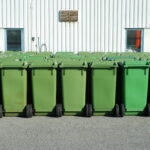As a business dedicated to tracking and preventing food waste, Leanpath has a strong pulse on the issue. Andrew Shakman, CEO & Co-Founder of Leanpath, makes the case that the problem of food waste is more relevant today than ever before. You can find the December 10, 2021 webinar recording here.
In the midst of an extreme labor shortage and inflation, many foodservice businesses are focused on protecting their bottom line before considering any operational improvements. But, Shakman argues that these economic conditions present an industry-wide incentive to address food waste.
Food prices are the highest they’ve been in a decade, which means the cost of food waste is also at a high. Leanpath’s data shows that 4-10% of food is discarded as pre-consumer waste in the foodservice industry. The cost of this food waste is made up of more than just the food itself; labor and wages, which are increasingly costly for businesses, must be factored in as well, not to mention the cost of hauling discarded food. It has also been found that working with smaller amounts of food can produce a higher percentage of food waste. Therefore, when food and labor are unusually expensive, businesses are more likely to use less and inadvertently waste more.
Naturally, food waste reduction can go hand in hand with cutting costs and increasing efficiency. Taking steps to reduce food waste can positively impact purchasing, hauling, and energy costs. These indirect savings can accumulate impactfully. The practice of food waste tracking exposes operational efficiency. Staff who are trained to save food that would otherwise be unnecessarily prepared and wasted can hold each other accountable. For foodservice businesses, reducing surplus at the source and donating unused food is an excellent way to positively impact your local community.
To raise awareness of the importance of food waste prevention, consider sharing this information and the Leanpath webinar with the key stakeholders at your business. Getting to know your waste through an initial estimation and/or tracking is the first step to effective food waste prevention. Food waste tracking can be consciously, and later seamlessly, integrated into existing workflows. In addition to Leanpath, Winnow, and Phood provide waste tracking technology services.
Your business can also embark on a food waste reduction initiative completely independently using the RecyclingWorks Food Waste Estimation Guide and EPA Food Waste Tracking Guide. Then challenge your organization to set a specific 2022 food waste reduction goal! You can also start here with RecyclingWorks source reduction of food waste guidance.
Are you in the foodservice industry and interested in free, outside waste expertise? RecyclingWorks offers no-cost technical assistance to evaluate business’ waste streams and recommend strategies and best practices for food waste reduction, separation, and recovery. Contact us to get started: 888-254-5525 or info@recyclingworksma.com.

